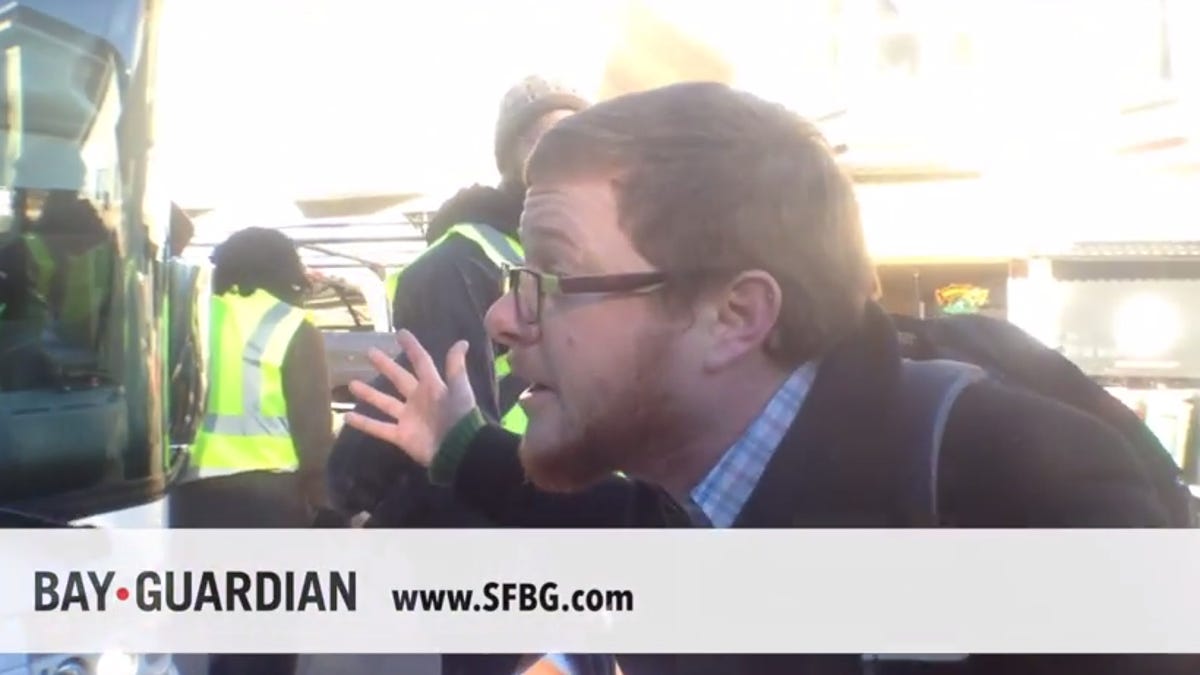Fake Google employee's fight with protesters some wish was true
So a Google employee reportedly went off on protesters blocking the company's San Francisco shuttle bus was staged. Turns out it was staged and the resulting outrage fed narrative that speaks volumes about the great tech backlash 2014.

His name is Max Alper and this morning he decided to hop onto Google's Wi-Fi-equipped shuttle bus at 24th Street and Valencia in San Francisco's Mission district, knowing full well that it would be stormed by community activists protesting Silicon Valley's influence on rental prices and the city's pre-tech boom diversity and culture.
He knew that because the Berkeley resident and union organizer does not live around the corner from the shuttle stop, as he claimed. He doesn't work at Google. Yet he conveniently exited the bus and began deriding the protesters, hitting high notes with "You can't afford it? Then leave" and, "I can pay my rent. Can you pay your rent?"
Naturally, the story went viral after the San Francisco Bay Guardian filmed Alper. It was picked up by Gawker blog Valleywag. There were of course red flags. Neither the Bay Guardian nor Al Jazeera America -- teams from both of which nipped at Alper's heels as he stormed off in apparent nerd rage -- were able to confirm his identity. Former Googlers also noted on Twitter that speaking out in such a manner would have been widely condemned by the company, if not leading to getting fired. But he was wearing a pea coat and had nice glasses and so he probably worked at Google, the logic went.
The snark came out in full force and from all angles, myself included. Not only did the story reek of potential Upworthy or BuzzFeed treatment -- "You Won't Believe What This Google Employee Said To Someone Wearing A Reflective Vest" -- but on a deeper level it was emblematic of the backlash against the technology industry. The epicenter is here in San Francisco and the most vocal of voices in the city's Mission district, where rental prices have skyrocketed and a deluge of polished coffee shops and restaurants with patio heaters for their outdoor seating have displaced much of the streets' Hispanic roots and oddity culture that many long-term residents feel is decaying with the influx of wealth.
And when the hoax was discovered, people were more or less unfazed by yet another campaign that successful preyed on our tendency to share before we think. Still, people couldn't whitewash the backlash, and it exists as a testament to rising tensions between the tech industry and its apparent god complex and those feeling its real-world effects reverberate through communities, cities, and even state regions. Here in the other end, we as users -- and the likely more than just a few community activists -- enjoy a company's products and services daily while questioning their pervasiveness and scoffing at the high rises, a stance that retains undeniable hints of envy in our accusations over tech company coddling and its free meals and transportation and limitless Froyo.
Most importantly, that Alper fooled the media and ballooned the protesters' cause is now less important than the fact that we desperately wanted it to be true. That Alper could create a condescending persona with less than a minute and a half of scripted exasperation, and have that immediately resonate with hundreds of people, means that the problems the Google bus protesters were trying to illuminate are not exaggerated. The episode, an act of performance art, merely underlined them.
These days, you can't go far on Valencia either without seeing a display of this community rage. From the "social media is stupid" stickers and the "yuppie go home" graffiti to the funeral-themed murals emblazoned on the walls of once-affordable apartment units, what may have once been snark now seethes with the energy of a class struggle. Don't call them "techies" as that term -- like hipster and yuppie -- is now considered derogatory, flung at Google employees and cafe entrepreneurs alike and even employed by local drag performers in a singing, satirical takedown. Not helping are supposedly, but not really, satirical blog posts from startup CEOs mocking SF women and deriding the city's homeless.
While those blaming San Francisco's rent crisis on tech workers are waging a local war, a larger mission has emerged in online conversation with its sights set on keeping Silicon Valley grounded and levelheaded. Gone are the days when "change the world" meant something more than a go-to source of ridicule over industry hyperbole, and each new startup is now evaluated by the greater public not by how it stacks up against Dropbox or Instagram, but by the silliness of the Uber-like excessive convenience it aims to deliver. The tech industry is so fed up with our thanklessness that some of its more audacious proponents want to up and "exit," or in other words live out the dream of techno-utopias.
These issues are clearly not going away anytime soon, neither will a protest outside of Big Mouth Burgers do anything more than shine a spotlight. However, what Alper did was something special. He lied to us, and in doing so, got us all to start throwing rocks and then look only at each other when the mirror shattered. Mission accomplished.

